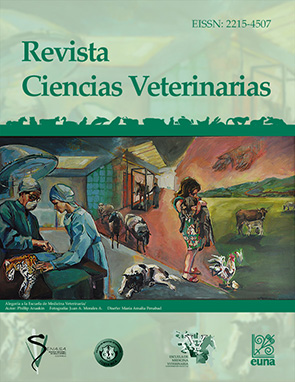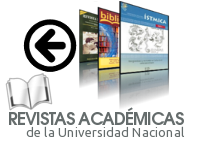Carta al Editor Es erróneo hacer una asociación directa entre la detección de Helicobacter spp. y gastritis en caninos
DOI:
https://doi.org/10.15359/rcv.35-2.1Palabras clave:
Helicobacter, gastritis, bacterial load, Helicobacter pyloriResumen
It has been proposed that Helicobacter may play a significant role in the generation of gastritis and cancer in dogs. However, despite several independent efforts, there is still controversy regarding the true ability of Helicobacter to cause gastric lesions in these animals. The foregoing is due in part to the fact that gastritis is a multifactorial disease. Studies focused on naturally acquired infections have been unable to establish a positive correlation between Helicobacter colonization and gastritis. Establishing a clear association between the presence of Helicobacter and gastritis may be difficult due to the following reasons: (i) taxonomy of the genus Helicobacter remains unclear, (ii) virulence factors of Helicobacter species that colonize dogs are not well known, and (iii) simultaneous infections have been reported with several species of Helicobacter. Current knowledge in taxonomy and pathogenesis of Helicobacter species is insufficient to differentiate between pathogenic and non-pathogenic strains. Therefore, no direct association should be made between the detection of Helicobacter and gastritis.Referencias
Amorim, I., Smet, A., Alves, O., Teixeira, S., Saraiva, A.L., Taulescu, M., Reis, C., Haesebrouck, F. & Gärtner, F. 2015. Presence and significance of Helicobacter spp. in the gastric mucosa of Portuguese dogs. Gut Pathog. 7: 12. doi:10.1186/s13099-015-0057-1
De Bock, M., Decostere, A., Hellemans, A., Haesebrouck, F. & Ducatelle, R. 2006. Helicobacter felis and Helicobacter bizzozeronii induce gastric parietal cell loss in Mongolian gerbils. Microbes Infect. 8 (2): 503–510. doi:10.1016/j.micinf.2005.08.003
Flahou, B., Van Deun, K., Pasmans, F., Smet, A., Volf, J., Rychlik, I., Ducatelle, R. & Haesebrouck, F. 2012. The local immune response of mice after Helicobacter suis infection: strain differences and distinction with Helicobacter pylori. Vet. Res. 43: 75. doi:10.1186/1297-9716-43-75
Harbour, S. & Sutton, P. 2008. Immunogenicity and pathogenicity of Helicobacter infections of veterinary animals. Vet. Immunol. Immunopathol. 122 (3-4): 191–203. doi:10.1016/j.vetimm.2007.12.003
Jergens, A.E., Pressel, M., Crandell, J., Morrison, J.A., Sorden, S.D., Haynes, J., Craven, M., Baumgart, M. & Simpson, K.W. 2009. Fluorescence In Situ Hybridization Confirms Clearance of Visible Helicobacter spp. Associated with Gastritis in Dogs and Cats. J. Vet. Intern. Med. 23: 16–23. doi: 10.1111/j.1939-1676.2008.0211.x
Joosten, M., Blaecher, C., Flahou, B., Ducatelle, R., Haesebrouck, F. & Smet, A. 2013. Diversity in bacterium-host interactions within the species Helicobacter heilmannii sensu stricto. Vet. Res. 44: 65. doi:10.1186/1297-9716-44-65
Joosten, M., Lindén, S., Rossi, M., Chin Yen Tay, A., Skoog, E., Padra, M., Peters, F., Perkins, T., Vandamme, P., Van Nieuwerburgh, F., D’Herde, K., Van den Broeck, W., Flahou, B., Deforce, D., Ducatelle, R., Marshall, B., Haesebrouck, F. & Smet, A. 2016. Divergence between the Highly Virulent Zoonotic Pathogen Helicobacter heilmannii and Its Closest Relative, the Low-Virulence “Helicobacter ailurogastricus” sp. nov. Infect. Immun. 84: 293–306. doi:10.1128/IAI.01300-15
Mitchell, H.M., Rocha, G.A., Kaakoush, N.O., O’Rourke, J.L. & Queiroz, D.M.M. 2014. The Family Helicobacteraceae. In: Rosenberger, E., DeLong, E.F., Lory, S., Stackebrandt, E. & Thompson, F. (Eds.). The Prokaryotes. Springer Berlin Heidelberg, Berlin, Heidelberg, pp. 337–392. doi:10.1007/978-3-642-39044-9_275
Suárez-Esquivel, M., Alfaro-Alarcón, A., Guzmán-Verri C. & Barquero-Calvo E. 2017. Analysis of the association between Helicobacter spp. burden and gastric lesions in dogs. Am J Vet Res. 78 (12). In press.
Publicado
Cómo citar
Número
Sección
Licencia
Licenciamiento de los artículos
Todo artículo se publicará con una licencia:

Licencia Creative Commons Atribución-NoComercial-SinDerivadas 3.0 Costa Rica.
El acceso a esta revista es gratuito, solo se debe citar en forma completa el artículo y la revista.
Los derechos de propiedad intelectual son del autor. Una vez aceptado el artículo para su publicación el autor cede a la Revista los derechos de reproducción.
La Revista de Ciencias Veterinarias autoriza la impresión de artículos y fotocopias para uso personal. También, se promueve el uso para fines educacionales. Especialmente: instituciones podrán crear enlaces a artículos específicos que se encuentren en el servidor de la revista a fin de conformar paquetes de cursos, seminarios o como material de instrucción.
El autor puede colocar una copia de la versión definitiva en su servidor aunque se recomienda que mantenga un enlace al servidor de la revista donde está el artículo original.
Las violaciones de propiedad intelectual recaen sobre quien la realizó. No es responsable la empresa o institución que da acceso a los contenidos, ya sea porque actúa sólo como transmisora de información (por ejemplo, proveedores de acceso a Internet) o porque ofrece servicios públicos de servidores.







